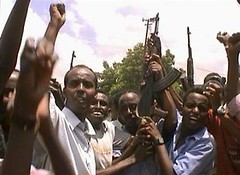
Somalia resistance fighters have pledged to defeat US-backed occupation forces. Attacks against the Ethiopian army have intensified since March, 2007.
Originally uploaded by Pan-African News Wire File Photos
04:32 Mecca time, 01:32 GMT
US military aid troubles Africa
While some are glad of US aid, others feel it comes at a price
The US military say they are fighting an unconventional war in Africa through the newly activated Africa Command, or Africom, by focusing on humanitarian efforts and training African armies – with the promise of preventing terrorism.
Haru Mutasa, Al Jazeera's Africa correspondent, reports on why some people are questioning the motives behind the aid and why it is linked to the US military.
Many families lost everything in Kenya's post-election violence 10 months ago.
In Ngarua Primary School in Eldoret in Western Kenya, there used to be a classroom. Now lessons take place inside a tent.
After the violence, the Kenyan government asked the United States to help rebuild the school.
"I didn't even know where to start," says Jane Mureithi, a teacher at the school.
"But when they came and told us they were going to help, I was so happy. It was the first assistance I got."
US soldiers have now almost finished construction and, by early next year, teaching in tents will be a thing of the past.
'No ulterior motive'
But many people are asking, what is in it for the Americans?
"I can tell you with a straight face, and I swear on my mother's grave, our mission here is purely humanitarian," says Paul Deis, a US Navy Captain.
"There's no ulterior motive."
People in Kenya's Rift Valley do need help in rebuilding their lives - some say they are still too scared to go home.
But sceptics believe there is another reason why the US is doing humanitarian work in Africa.
And some Africans even suspect George Bush, the US president, is on an anti-Islamic crusade here.
"They are not doing it for the sake of trying to assist us in education and health," says local Sheikh, Mohamed Dor.
"What they are trying to do is create a temporary base where, according to them, they still think there are al-Qaeda networks at the coast.
"But I can assure you there are no al-Qaeda networks at the coast [nor] all over Kenya."
Leaders wary
The US says it sees the Horn of Africa as a potential haven for "terror groups".
And that is why African soldiers are being trained in Djibouti and other parts of the continent - one way the US hopes to win its so-called "war on terror".
It is also partly why the US wants an African command centre based on the continent, to co-ordinate all American military and security interests - an area of responsibility covering all of Africa, except Egypt.
The budget for 2008 was $75.5 million. For the 2009 financial year, the US defence department asked congress for $392 million, a huge leap.
But because most African leaders are wary of the military initiative, Africom is still run out of Germany.
So, to build trust on the continent, the US is trying to win "hearts and minds".
Suspicions remain
Refugees International says the amount of development aid controlled by the Pentagon has shot up from three per cent to 22 per cent, but the percentage controlled by the US Agency for International Development (USAID) has shrunk from 65 per cent to 40 per cent.
"I don't see Africom as an organisation that should be a major player in humanitarian aid projects – that’s not the role of the US military," says David Shinn, a political analyst at George Washington University.
"And I think that was talked up at the beginning as sort of the new concept for a military command.
"The final analysis is that non-governmental organisations, USAID and international organisations ought to be doing the vast majority of that."
Instead, some analysts suggest that the US adopt a different approach to fighting terrorism - by implementing effective policies that promote good governance and democracy – instead of military force in places like Somalia for example.
But some Africans are still suspicious of the US.
While grateful for the humanitarian assistance they are getting, many are wary of how a militarised US policy towards Africa will affect them in the future.
Source: Al Jazeera
1 comment:
Somehow, America's policies are naked and visible to everyone as of late.
Some humanitarian agencies like USAID would be enough to deliver the aid to the people. Other International NGOs could be funded just like the EC do and that should make sure to achieve both the interest and winning the hearts of people.
Imagine a group of Military forces carrying their guns, coming with tanks and other military transport and telling you they are here to dig a well, build a school or run a hospital. Everybody knows why even the maids and the goat herders.
Post a Comment